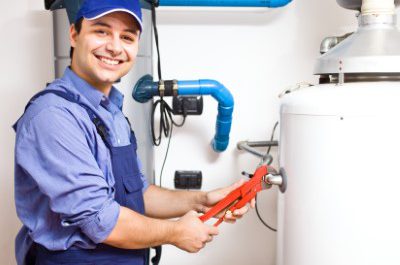Having a functioning water heater is essential to the comfort of your home. Without one, you can’t take hot showers, do laundry, or clean dishes. However, hot water heater tanks don’t last forever. Over time, they can break down and need to be replaced. To help you identify when your water heater needs to be replaced, here are five signs to look for.
Water Heater Signs
1. Age – One of the most obvious signs that your water heater is nearing the end of its life is its age. On average, water heaters last between 8 and 12 years. If your water heater is approaching or has surpassed this age range, it is likely time for a replacement. Old water heaters are prone to developing leaks and experiencing other problems that can disrupt your daily life. Regular maintenance can help prolong the lifespan of your water heater, but even with proper care, it will eventually wear out over time. If your water heater is older than 10 years, you may want to consider replacing it to avoid potential issues.
2. Rust or Corrosion – If you notice corrosion or rust on your water heater, it is a sure sign of trouble. Corrosion can weaken the tank and cause leaks, leading to water damage and potential flooding. Additionally, rusted components, such as valves and fittings, can affect the overall functionality and efficiency of the water heater. Corrosion can be caused by a variety of factors, including the age of the water heater, hard water, and exposure to moisture. Regular maintenance, including draining and flushing your water heater annually, can help prevent corrosion. However, if you observe significant rust or corrosion on your water heater, it is crucial to address the issue promptly. A professional can determine if repairs are possible or if a replacement is necessary to ensure your safety and prevent further damage.
3. Leaks – Water leaks are never a good sign, especially when it comes to your water heater. Leaks can indicate a range of issues, from a small and easily fixable problem to a major fault that requires immediate attention. Regardless of the severity, any sign of leakage should be taken seriously. If you notice water pooling around your water heater or signs of water damage, it is crucial to investigate the source of the problem. Leaks can cause extensive damage to the surrounding area, including walls, flooring, and furniture. In some cases, leaks can lead to mold growth, posing health hazards to you and your family. While minor leaks may be repairable, significant leaks or repeated instances of leaking may indicate a more serious issue. In such cases, it is wise to consult a professional plumber to assess the situation and determine if a replacement is necessary.
4. Strange Noises – Water heaters should operate relatively silently. However, if you notice loud rumbling, popping, or banging noises coming from your water heater, it is a sign that something is amiss. These noises are often caused by the accumulation of sediment and mineral deposits at the bottom of the tank. As sediment builds up, it hardens and creates a layer of insulation between the burner and the water, making it less efficient and causing the water heater to work harder. The excessive strain on the water heater can lead to premature failure and potential leaks. If you frequently hear unusual noises coming from your water heater, it is advisable to have it inspected by a professional and consider replacing it if necessary.
5. Inconsistent Water Temperature – If you find yourself taking cold showers or struggling to get hot water for basic household tasks, it could be a sign that your water heater is on its last legs. Over time, sediment and mineral deposits can build up in the tank, reducing its efficiency and ability to heat water effectively. While occasional cold showers can be attributed to heavy water usage or a temporary problem, consistent lack of hot water is a clear indication that your water heater is struggling to keep up. In such cases, it is worth considering a replacement to ensure a reliable supply of hot water for your everyday needs.
Water Heater Troubleshooting
If you’re experiencing any of these signs with your water heater tank, the first step is to troubleshoot the issue. You can start by checking the thermostat on the water heater and making sure it’s set to the proper temperature. If that doesn’t solve the issue, it may be time to call a local plumber.
Water Heater Repair
If your water heater is experiencing any of the issues above, it’s important to call a professional plumber for help. A plumber can inspect the water heater and diagnose the problem. Depending on the issue, they may be able to repair the water heater or recommend a replacement. Most plumbers should know where to get a new water close by and be able to install one quickly if the need arises.
In conclusion, there are several signs that your water heater may need to be replaced. If you notice any of the signs above, you should troubleshoot the issue and contact a licensed plumber for help.
